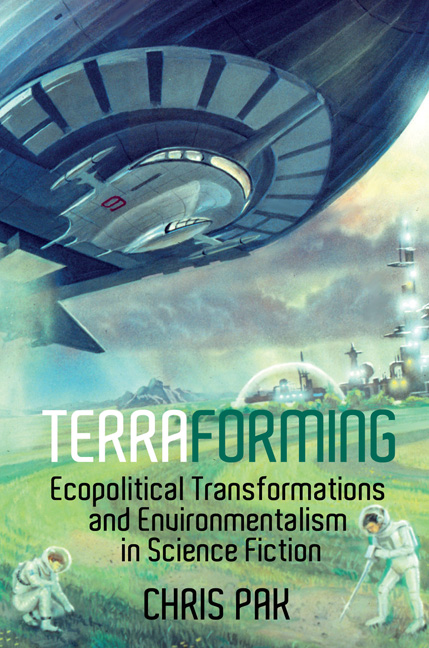Book contents
- Frontmatter
- Dedication
- Contents
- Acknowledgements
- Introduction: Terraforming: Engineering Imaginary Environments
- 1 Landscaping Nature's Otherness in Pre-1960s Terraforming and Proto-Gaian Stories
- 2 The American Pastoral and the Conquest of Space
- 3 Ecology and Environmental Awareness in 1960s–1970s Terraforming Stories
- 4 Edging Towards an Eco-cosmopolitan Vision
- 5 Kim Stanley Robinson's Mars Trilogy
- Conclusion
- Works Cited
- Index
4 - Edging Towards an Eco-cosmopolitan Vision
- Frontmatter
- Dedication
- Contents
- Acknowledgements
- Introduction: Terraforming: Engineering Imaginary Environments
- 1 Landscaping Nature's Otherness in Pre-1960s Terraforming and Proto-Gaian Stories
- 2 The American Pastoral and the Conquest of Space
- 3 Ecology and Environmental Awareness in 1960s–1970s Terraforming Stories
- 4 Edging Towards an Eco-cosmopolitan Vision
- 5 Kim Stanley Robinson's Mars Trilogy
- Conclusion
- Works Cited
- Index
Summary
Ursula K. Heise argues for ‘the urgency of developing an ideal of “eco-cosmopolitanism,” or environmental world citizenship,’ claiming that it is ‘imperative to reorient current U.S. environmentalist discourse, ecocriticism included, toward a more nuanced understanding of how both local cultural and ecological systems are imbricated in global ones’ (2008, 10, 59). She considers local, national and global forms of identity manifest in the environmental movement since the 1960s and in ecocriticism in the 1990s, tracing the shifting scholarly debate regarding conceptions of the local and global. Heise begins with the concept of globalisation, which rose to prominence in the late 1990s as ‘the central term around which theories of current politics, society, and culture in the humanities and social sciences are organized’ (4). Although the parameters of these debates and the poststructuralist critique of essentialist nation-based identities that arose began in the early 1980s to mid-1990s, Heise claims that globalisation is beginning to supersede others in theories of postmodernism and postcolonialism. Theories of hybridity, creolisation, mestizaje, migration, boderlands, diaspora, nomadism, exile and deterritorialisation provided countermodels to essentialist, nation-based concepts of identity, while in the later 1990s concepts such as ‘transnationalism’ and ‘critical internationalism’ and the resurgent concept of ‘cosmopolitanism’ in discussions of globalisation began to take priority. She observes that counter-critiques to globalisation have emphasised ‘the value of local and national identities as forms of resistance to some dimensions of globalization,’ resulting in a theoretical impasse (5–6). Against this scholarly background, Heise argues that modern environmentalism has been concerned with issues of the local and global since the movements of the 1960s and 1970s.
Terraforming stories have explored concerns that Heise argues are central to an eco-cosmopolitan awareness, having considered the politics of globalisation since Wells's The Shape of Things to Come. Heise's discussion of deterritorialisation offers a useful theoretical concept for organising the themes explored in preceding chapters of this book. As terraforming is a process of adaptation and habitation, it too can lead to processes of deterritorialisation. Heise explains that
The increasing connectedness of societies around the globe entails the emergence of new forms of culture that are no longer anchored in place, in a process that many theorists have referred to as ‘deterritorialization.’
- Type
- Chapter
- Information
- Publisher: Liverpool University PressPrint publication year: 2016

